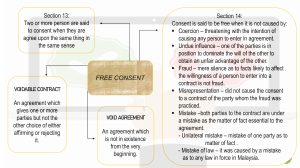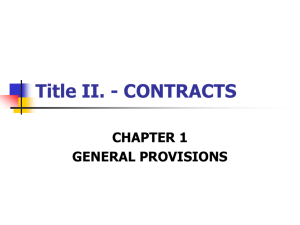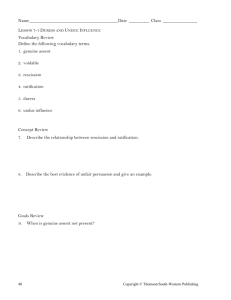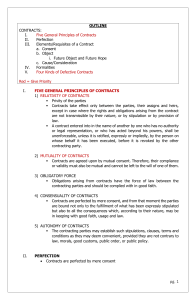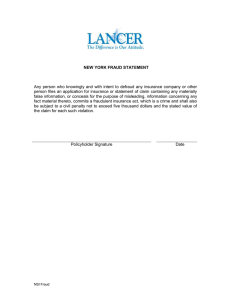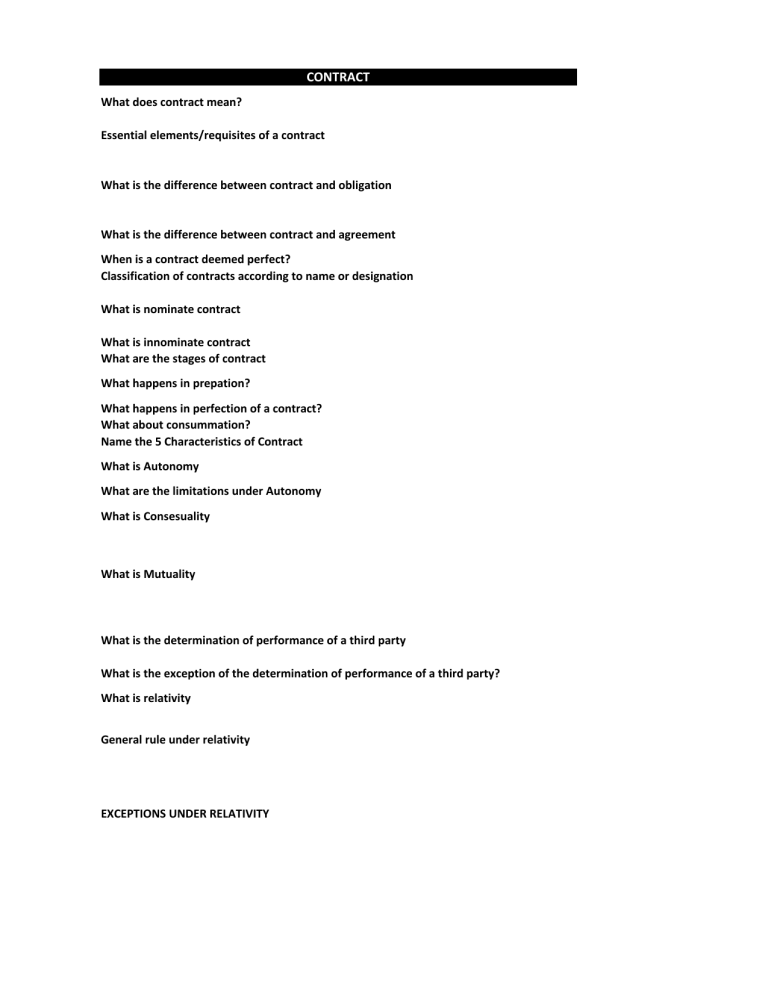
CONTRACT What does contract mean? Essential elements/requisites of a contract What is the difference between contract and obligation What is the difference between contract and agreement When is a contract deemed perfect? Classification of contracts according to name or designation What is nominate contract What is innominate contract What are the stages of contract What happens in prepation? What happens in perfection of a contract? What about consummation? Name the 5 Characteristics of Contract What is Autonomy What are the limitations under Autonomy What is Consesuality What is Mutuality What is the determination of performance of a third party What is the exception of the determination of performance of a third party? What is relativity General rule under relativity EXCEPTIONS UNDER RELATIVITY Instances where a third person may be affected by a contract: What is the treatment of unathorized contract (Article 1317) ESSENTIAL CHARACTERISTICS OF CONTRACTS No contract unless: An acceptance may be: (Article 1321) The person making the offer may fix the time, place, and manner of acceptance, all of which must be complied with. If offer is made thru an agent When does an offer becomes ineffective? CONTRACT OF OPTION; OPTION PERIOD; OPTION MONEY How is business advertisment is treated? Who cannot give consent to a contract? (VOIDABLE CONTRACTS) Exceptions under persons who cannot give consent Article 1328. Contracts entered into during a lucid interval are VALID Factors that may vitiate consents What if a contract where consent is given through mistake, violence, intimidation, undue influence, or fraud? MISTAKE OR ERROR Mistake of fact to which law refers: BURDEN OF PROOF IN CASE OF MISTAKE OR FRAUD TREATMENT, UNABLE TO READ, ANOTHER LANGUAGE MISTAKE OF LAW VIOLENCE & INTIMIDATION TO VITIATE CONSENT UNDUE INFLUENCE FRAUD Requisites of fraud What constitutes a fraud? Is usual exaggerations in trade fraudulent? Is mere opinion signify fraud? Does misrepresentation by a third person vitiate consent? Is misrepresentation made in good faith fraudulent? How can fraud make a contract VOIDABLE? TWO KINDS OF FRAUD IN MAKING OF A CONTRACT What is simulation of a contract? Kinds of simulation contract Article 1346. An absolutely SIMULATED or FICTITIOUS contract is void. ESSENTIAL CHARACTERISTICS OF CONTRACTS What is the object of contract? Future inheritance: Kinds of object in a contract? Requisites of THINGS as Object of a contract IMPOSSIBLE THINGS cannot be OBJECT of a contract (1348) General rule under RIGHTS as Object Exception under RIGHTS as Object ESSENTIAL CHARACTERISTICS OF CONTRACTS Meaning of causa (cause)/consideration CLASSIFICATION OF CONTRACT ACCORDING TO CAUSE What is Onerous What is Renumenatory What is Gratuitous Art. 1351 – Motive Difference between cause and motive Requisites of Cause Article 1352. Contracts without cause, or with unlawful cause, produce no effect whatever. Effect of absence of cause (up) Effect of inadequacy of cause/failure of cause Effect of Illegality of cause Effect of falsity of cause (Art. 1353) Is it necessary for the cause to be expressly stated? LESION/INADEQUENCY OF CAUSE (Art. 1355) GENERAL RULE OF LESION Various incidents of causal incidents in a contract: CHAPTER 3 : FORMS OF CONTRACT Form of a contract Classification of contratcs according to form GENERAL RULE EXCEPTION IN THE GENERAL RULE: WHEN IS FORM NECESSARY? Art. 1358 – Documents that must appear in a public document CHAPTER 4 : REFORMATION OF INSTRUMENTS Reformation REQUISITES: INSTANCES when reformation is the remedy: WHEN IS REFORMATION NOT ALLOWED? (Art. 1366) INTERPRETATION OF CONTRACTS Article 1367. When one of the parties has brought an action to enforce the instrument, he cannot subsequently ask for its reformation. Article 1368. Reformation may be ordered at the instance of either party or his successors in interest, if the mistake was mutual; otherwise, upon petition of the injured party, or his heirs and assigns. Article 1369. The procedure for the reformation of instrument shall be governed by rules of court to be promulgated by the Supreme Court CHAPTER 5 : INTERPRETATION OF CONTRACTS If the language is clear, the contract is interpreted in its literal meaning (Art. 1370) In judging the intention of the contracting parties special intent prevails general intent (1372) In contracts with stipulation with several meanings Various stipulations of a contract Words which may have different significations Interpretation of the ambiguities of a contract Interpretation of obscure words or stipulations in a contract Rules in case of doubts are impossible to settle (1378) CHAPTER 6 : RECESSIBLE CONTRACTS Rescission Rescissible contracts Requisites of Rescission Contracts that are rescissible: Art. 1382 Payments made in the state of insolvency are rescissible Art. 1383. The action for rescission is subsidiar Art. 1384. Rescission shall only be to the extent necessary to cover the damage caused. Art. 1385 EFFECT OF RESCISSION WHEN RESCISSION IS NOT ALLOWED? Art. 1387. Alienation presumed in fraud of creditors Art. 1388 Liability of purchaser in bad faith Art. 1389 Prescription period for Rescission Persons entitled to bring the action: CHAPTER 7 : VOIDABLE CONTRACTS VOIDABLE CONTRACT the following contracts are voidable or annullable, even though there may have been no damage to the contracting parties: ANNULMENT Art. 1391. the action for annulment shall be brought within four (4) years. Art. 1392 – RATIFICATION Art. 1393 – Express or implied ratification Requisites of implied ratification Art. 1394 Who may effect ratification? Art. 1395. conformity of guilty party to ratification Art. 1396. Effect of ratification Art. 1397. Party entitled to bring action to annul Rights of successors-in-interest to bring an action Right of strangers to bring an action Art. 1398 duty of mutual restitution upon annulment Art. 1402 effect where a party cannot restore what he is bound to return CHAPTER 8 : UNFORCEABLE CONTRACTS UNENFORCEABLE CONTRACTS (Art. 1403) KINDS: UNAUTHORIZED CONTRACTS Art. 1405. Ratification Art. 1406. Right of a party where contract enforceable. Art. 1407. When unenforceable contract becomes a voidable contract When unenforceable contract becomes a valid contract Art. 1408. Unenforceable contracts cannot be assailed by third persons CHAPTER 8 : VOID AND INEXISTENT CONTRACTS VOID OR INEXISTENT CONTRACTS (Art. 1409) Inexistent contracts CHARACTERISTICS: INSTANCES OF VOID OR INEXISTENT CONTRACTS Art. 1410. action for declaration of inexistence of a contract does not prescribe Art. 1411. Rules where contract is illegal and the act constitutes criminal offense Art. 1412. Rules where contract is illegal but the act is not a criminal offense WHEN PARI DELICTO RULE NOT APPLICABLE? Art. 1413. Interest paid in excess of the interest allowed by the usury laws may be recovered by the debtor, with interest thereon from the date of the payment. Art. 1414. Recovery where contract for an illegal purpose Art. 1415. Recovery by an incapacitated person Art. 1416. Recovery where contract not illegal per se Art. 1417. Recovery of amount paid in excess of ceiling price Art. 1418. Recovery to additional compensation for service rendered beyond time limit Art. 1419. Recovery of amount of wage less than minimum fixed Art. 1420. Effect of illegality where contract is indivisible/divisible Art. 1421. Persons entitled to raise defense of illegality or nullity Art. 1422. Void contract cannot be novated ANSWERS & EXPLANATION Meeting of minds between two contracting parties whereby one commits to give something or render a service for the other. 1.) Consent, 2.)Object/subject matter, 3.)Cause of consideration, 4.) Compliane to statutory limitations * Contract - source of obligation, no contract = no obligation Obligation - broader than contract (legal tie that exist after a contract is entered into), can exist without contract since there are other sources of obligations (law, quasi-contracts, delicts, quasi-delicts) * Contract are enforceable agreements through legal proceedings. All contract are agreements but not all agreements are contract It should have consent, object, and consideration 1.) Nominate, 2.) Innominate They have a specific name and designation in the law (contract of sale, contract of partnership, contract of pledge, contract of shuttle mortgage, contract of commodatum, contract of mutuum and etc No specific name or designation in the law 1.) Preparation/Negotiation, 2.) Perfection, 3.) Consummation, 4.) Scholar's dissent all the steps taken by the parties leading to the perfection of the contract. Parties have not yet arrived to an agreement. (Negotiation for the formation of the contract) when parties have come to an agreement or meeting of the minds when the parties have performed their respective obligations MARCO (Mutuality, Autonomy, Relativity, Consesuality, Obligatoriness) where there is a sense of freedom; contracting parties may establish contract (SCTC-stipulations, clauses, terms and condition) as long as it is not contrary to law, public policy, morals. LAMOGPP (Law, Morals, Good Customs, Public order, Public policy perfected by mere consent of the parties regarding the subject matter and cause of contract, consesual such as contract of sale, lease, agency (napagusapan pa lang) - contract must bind both contracting parties - NO party can renounce or violate the law of the contract without the consent of the other. Hence, its validity or compliance cannot be left to the will of only one only one of them - a contract which its fulfillment or extinguishment is dependent upon the will of ONLY ONE of the parties is VOID. - The determination of the performance may be left to a third person -The decision of the third person shall bind the parties ONLY AFTER IT HAS BEEN MADE KNOWN TO BOTH PARTIES When the determination is inequitable. The court shall decide what is equitable - Contracts are generally effective only between parties, their ASSIGNS and their HEIRS (since naturally transmissable yung rights and obligations to successors and heirs) Contracts are generally effective only between parties, their ASSIGNS and their HEIRS Therefore, Third person has no rights and obligations under a contract to which he is not a part of or stranger of *STIPULATION POUR AUTRUI 1. If the contract has STIPULATION 2. IN FAVOR of a THIRD person 3. the contracting parties has CLEAR AND DELIBERATE CONFERMENT OF SUCH FAVOR upon the third person 4. Third person COMMUNICATED his acceptance to such stipulation In contracts creating real rights, third persons who come into possession of the object of the contract are bound thereby, subject to the provisions of the Mortgage Law and the Land Registration Laws. (Article 1312) Creditors are protected in cases of contracts intended to defraud them (Article 1313) Any third person who induces another to violate his contract shall be liable for damages to the other contracting party. (Article 1314) Unforceable in nature e; A contract entered into in the name of another by one who has no authority or legal representation, or who has acted beyond his powers, shall be unenforceable SECTION 1: CONSENT 1. there is CONSENT (conformity of the wills of both parties) > manifested by the meeting of the offer and the acceptance upon the thing and the cause which are to constitute the contract > offer must be CERTAIN and acceptance ABSOLUTE. > A qualified acceptance constitutes a counter-offer. expressed or implied (Article 1320) the offer is accepted from the time the same is communicated 1. Death 2. Civil interdiction 3. Insanity 4. Insolvency of either party before acceptance is conveyed. 5. expiration of the period or loss of the thing when the period of the offer's acceptance is certain, it is withdrawable until it is not yet accepted BUSINESS ADVERTISEMENTS NOT DEFINITE OFFERS, ONLY MERE INVITATION TO MAKE OFFER. 1. Umemanicapted minors (under parental authority) 2. Insane or demented persons 3. deaf-mutes who do not know how to write i. contracts involving necessaries ii. guardianship iii. misrepresentation, and the other party acted in good faith Contracts agreed to in a state of drunkenness or during a hypnotic spell are VOIDABLE 1. mistake (material and substantive) 2. violence (serious or irresistible) 3. intimidation (reasonable and well-grounded fear of evil, imminent and grave upon the person, property, spouse, ascendant or descendant) 4. Undue influence 5. Fraud VOIDABLE the false notion of thing or a fact material to the contract 1. substance of the thing which is the object of the contract 2. conditions which have principally moved one or both parties to enter into contract 3. the identity of one of the parties provided in the same was the principal cause of the contract THE PARTY ENFORCING THE CONTRACT has the duty to show that there is no mistake or fraud on the terms of the contract – if a party knew about the doubt, contingency or risk affecting the object of the contact, it is presumed that he was willing to take a chance arises from an ignorance of some provision of law, or from an erroneous interpretation of its meaning – EFFECT: does not invalidate consent – APPLICATION: 1. when the error is mutual 2. it must be as to the legal effect of an agreement 3. it must frustrate the real purpose of the parties Violence – requires physical force Intimidation – there is a reasonable and wellgrounded fear of an evil that is imminent and grave upon a person or property so a person will enter into a contract A threat to enforce one's claim through competent authority, if the claim is just or legal, does not vitiate consent. Violence or intimidation shall annul the obligation, although it may have been employed by a third person who did not take part in the contract when a person takes improper advantage of his power over the will of another, depriving the latter of a reasonable freedom of choice. Causal fraud (dolo causante) - employed prior to or simultaneous to the consent or creation of the contract. 1. There must be MISREPRESENTATION (Art. 1338 – thru insidious words or machinations) or CONCEALMENT (Art. 1339 – failure to disclose facts). 2. It must be SERIOUS (Art. 1344) - in order that fraud may make a contract VOIDABLE, it must be serious. 3. it must have been employed by only one of the contracting parties (Art. 1342) * misrepresentation by a third person does not vitiate consent , unless it creates substantial mistake and the same is mutual. 4. it must be made in bad faith or with intent to deceive (Art. 1343) 5. it must have induced the consent of the other contracting party (Art. 1338) 6. it must be alleged and proved by clear and convincing evidence Failure to disclose facts, FALSE, usual exaggerations in trade is allowed FALSE, unless made by an expert and the other party has relied on the former's special knowledge. FALSE, unless such misrepresentation has created substantial mistake and the same is mutual. FALSE, but may constitute error it should be SERIOUS and should not have been employed by both contracting parties. 1. causal fraud – which may be a ground for annulment of a contract, but also gives rise for action for damages 2. incidental fraud – renders only the party who employs it liable for damages (Art. 1344, par. 2) > Art. 1170 – refers to incidental fraud (dolo incidente) - Committed in the performance of an obligation (at the stage of consummation) > comparable to causal fraud (dolo causante, Art. 1338) - means a fraud employed in the execution of contract which vitiates consent and makes the contract voidable - the other party is induced by word to enter into the contract (happens at the stage of perfection) the act of deliberately deceiving other, by feigning or pretending by agreement, the appearance of a contract which is neither inexistent or concealed Absolute = when the parties do not intend to be bound at all; when the contract does not really exist and the parties do not intend to be bound at all. Relative = when the parties conceal their true agreement; when the contract entered into by the parties is different from their true agreement SECTION 2: OBJECT OF CONTRACT Subject matter; the object of every contract is the obligation created NO CONTRACT may be entered into upon FUTURE INHERITANCE (considered VOID) except in cases expressly authorized by law. inheritance ceases to be in future upon death of the decendant 1.) Things, 2.) Rights, 3.) Services = ex. sale, assignment or credit, agency, respectively 1. must be within the commerce of men 2. must not be impossible 3. must be in existence or capable of 4. must be determinate (not generic) Article 1348. Impossible things or services cannot be the object of contracts. 1. Physical – when the thing or service in the very nature of things cannot exist a. Absolute – when the act cannot be done in any case (ex.flying) b. Relative – when it arises from the special circumstance of the case (ex. To make payment to a dead person) 2. Legal – when the thing or service is contrary to public morals, law, good customs, public order or policy (ex. Selling prohibited drugs) EFFECT: > Absolute – nullifies the contract > Relative – if temporary, does not nullify the contract; if permanent, it annuls the contract Article 1349. The object of every contract must be determinate as to its kind. The fact that the quantity is not determinate shall not be an obstacle to the existence of the contract, provided it is possible to determine the same, without the need of a new contract between the parties. (but the quantity does not need to be determinate) All rights may be the object of a contract. When they are transmissible by their nature, stipulation or provision of law (1311). Ex. 1. things outside of commerce of men – like things of public ownership (sidewalks, bridges, streets) SECTION 2: CAUSE OF CONTRACT the essential reason or more proximate purpose which contracting parties have in view at the time of entering into a contract something bargained for or given by a party in exchange for a legally enforceable promise of another 1.) Onerous, 2.) Renumenatory, 3.) Gratuitous one the cause of which , for each contracting party, is the prestation or promise of a thing or service by the other in this contract, both parties are obligated to each other one the cause of which is the service or benefit which is renumerated. The purpose is to give reward the service that had been previously rendered by the party renumerated. one the cause of which is the mere liberality of the benefactor or giver such as commodatum, pure donation and the like. purely personal or private reason which a party has in entering into a contract; particular motives of the parties in entering into a contract are different from the cause thereof 1. It must exist (no cause, no effect) 2. it must be lawful – not contrary to law, moral, xxx (Art. 1354) 3. It must be true or real (Art. 1353) The cause is unlawful if it is contrary to law, morals, good customs, public order or public policy. contracts without cause confers no right and produce no legal effect does not render a contract void (Ex. failure to pay the full amount stipulated in a contract does not nullify the contract immediately. makes the contract null and void Ex. A promise of marriage based upon carnal connection the contract is void because the same actually does not exist “statement of a false cause in contracts shall render them void, if it should not be proved that they were founded upon another cause which is true and lawful”. No. In such instance, the presumption is that the cause exists and is lawful, unless the debtor proves the contrary (Art. 1354) any damage caused by the fact that the price is unjust or inadequate does not invalidate the contract (Exp. - when there has been fraud, mistake or undue influence / or in cases specified by law.) 1. non-existent cause - VOID (1352, 1st part) 2. False cause in an ABSOLUTELY simulated contract - VOID (1346, 1353) 3. False cause in a RELATIVELY simulated contract - parties are bound to their real agreement (1346, 1353) -what is their remedy? REFORMATION (1359) 4. Inadequate cause (1355) - ex. Nagbenta ka ng lupa worth 1M, binenta mo ng 100k or 1/10 of its value shall not invalidate contract unless there's fraud. Mistake or undue influence REMEDY: Reformation (1470) - legal basis para maghabol ang creditor – Art. 1381 5. Failure of cause - if the seller failed to realize the price or does not deliver the thing to buyer = BREACH -REMEDY: Rescission the manner in which a contract is executed or manifested maybe in oral, writing or partly oral and partly in writing. if in writing, it may be in a public or private instrument all its terms must be in writing 1. Informal/Common/Simple Contract - may be entered into in whatever form provided all the essential requisities for their validity are present (consesual contracts, e.g. contract of sale) 2. Formal/Solemn - required by the law for its efficacy to be in a certain specified form Contracts may be obligatory or in any form as long as the three essential elements are present (consent, cause, object) 1. When the law requires a certain form for it to be valid. Ex. Donation of real property – public instrument Donation of personal property – in writing (the value of which exceeds P5,000.00) Sale of land thru an agent – in writing Contract of antichresis – in writing stipulation to pay interest – in writing, otherwise, no interest due contract of partnership – in a public instrument transfer of sale of large cattle – registered; in a public instrument negotiable instruments – in writing 2. when the law requires form for it to be enforceable (Art. 1403, p.2) > if the contract is not in writing, it is valid but it cannot be proved and cannot be enforced unless ratified. 3. when form is required for it to be convenient to the parties or for the third party (Art. 1357). > an action that can be used by parties to compel each other to follow a certain form of their contract for their own conveniences (1) Acts and contracts which have for their object the creation, transmission, modification or extinguishment of real rights over immovable property; sales of real property or of an interest therein are governed by articles 1403, No. 2, and 1405; (2) The cession, repudiation or renunciation of hereditary rights or of those of the conjugal partnership of gains; (3) The power to administer property, or any other power which has for its object an act appearing or which should appear in a public document, or should prejudice a third person; (4) The cession of actions or rights proceeding from an act appearing in a public document. remedy by means of which a written instrument is amended or rectified so as to express the real agreement when by reason of fraud, mistake or undue influence fails to express such true intention for reformation to be availed of as remedy, the following should be present: 1. there is meeting of the minds of the parties; 2.written instrument that does not express the true agreement; 3. failure to express true intention due to fraud, mistake, inequitable conduct or accident; 4. the relief are put in issue by the pleadings; and, 5. there is a clear and convincing evidence of mistake, fraud, inequitable conduct or accident. 1. mutual mistake (1361) - when both parties causes the failure of the instrument to disclose their real agreement 2. unilateral mistake (1362) - If one party was mistaken and the other acted fraudulently or inequitably in such a way that the instrument does not show their true intention, the former may ask for the reformation of the instrument. 3. concealment (1363) - when one party was mistaken and the other knew that the instrument did not state their real agreement but concealed it to the former. 4. mistake by a third party (1364) - when thru ignorance, lack of skill, negligence or bad faith on the part of the third person drafting the instrument and the latter does not express the true agreement ex. stenographer had a mistake in typing the records of the trial 5. mortgage or pledge as a sale (1365) - when two parties agreed upon the mortgage or pledge of real property but the instrument states that the property is sold with right of repurchase. 1. simple donations 2. wills 3. when the real agreement is void determination of the meaning of the terms used by the parties in their contract - involves a question of law apply the literal meaning if the provisions are clear; Evident intention of parties prevail over the terms of contract their contemporaneous and subsequent acts should be principally considered (1371) general the terms of a contract may be, they shall not be understood to comprehend things that are distinct and cases that are different from those upon which the parties intended to agree. ex. S sold his house “including all the furniture therein”. The term “all” should not be understood to include S' refrigerator which is distinct from “furniture”. it shall be understood as bearing the import which is most adequate to render it effectual (1373) shall be interpreted together, jointly (1374) shall be understood in that which is most in keeping the nature and object of the contract. (1375) The usage or custom of the place shall be borne in mind shall fill the omission of stipulations which are ordinarily established. shall not favor the party who caused the obscurity 1. when despite application of the preceding rules, certain doubts still exist, such will be resolved in accordance with the supplementary rules like the least transmission of rights and interests shall prevail. ex. R gave his car to E, it is not clear whether it is commodatum or donation. Hence, it should be presumed as mere commodatum because it would transmit lesser rights than a donation. 2. if the doubts are cast upon the principal object in such a way that it cannot be known what may have been the intention of the parties, the contract shall be NULL AND VOID (1378, par. 2) a remedy granted by law to the contracting parties and sometimes even to third persons in order to secure reparation of damages caused them by a valid contract, by means of the restoration of things to their condition prior to the celebration of said contract those validly agreed upon because all the essential elements exist but in the cases established by law, the remedy of rescission. 1. the contracting parties must be validly agreed upon (1380) 2. there must be lesion to one of the parties or to a third person (1381) 1. contracts entered into in behalf of wards, the latter suffered ¼ of the value of the object > ward – a person under guardianship by reason of some incapacity. > Ex. G is the guardian of W. G sells the property of W worth P20,000.00 for only P15,000.00. The contract of sale cannot be rescinded because the lesion is not more than ¼ of the value. However, if the property is sold for less than P15,000, W can rescind the sale by proper action in court. 2. Contracts agreed upon in representation of absentees; the latter suffered ¼ of the value of the object > Absentee – a person whi disappears from his domicile, his whereabouts unknown **In nos. 1 & 2, when the contract entered into is approved by the court, rescission cannot take place because it is valid whether there is lesion or not (1386). 3. Contracts undertaken in fraud of creditors > In order for this instance be a ground, the following must be present: a. there must be a credit prior to the contract to be rescinded; b. there must be fraud on the part of the debtor which may be presumed or proved c. the creditor cannot recover his credit in any other manner; debtor's insolvency is not required. 4. contracts which refer to things under litigation > Ex. S sues B for the recovery of a parcel of land. In this case, the land is a “thing under litigation”. Hence, if during the pendency of the case, B sells the land to C without S approval, the sale is rescissible by S. 5. Other instances: RESCISSION FOR BREACH OF CONTRACT versus RESCISSION BY REASON OF LESION a. Rescission on account of breach is not predicated on injury to economic interests but on the breach of faith by the defendant that violates the reciprocity between the parties. It is not a subsidiary action b. On the other hand, rescission by reason of lesion, the cause of action is subordinate to the existence of the prejudice. a debtor is insolvent if he does not have sufficient properties to meet his obligations it cannot be instituted except when the party suffering damage has no other legal means to obtain reparation Ex. G, guardian of M, a minor, authorized by the court to sell 2 parcels of land valued at P200k each. G sold the 2 lands for only P200k. In this case, the entire contract need not be rescinded, rescission can only be applied to one parcel of land to cover the damage caused by G. 1. Obligation of mutual restitution > when the parties declare a contract to be rescinded, the parties must return to each other (a) the object of the contract with its fruits and (b) the price thereof with legal interest. 2. Abrogation of contract > the party seeking rescission cannot ask performance as to part and rescission as to remainder 1. If the party who demands rescission cannot return what he is obliged to restore under the contract (1385, p.1) 2. if the property is legally in possession of a third person who acted in good faith (1385, p.2) the provision establishes fraud in case of alienation of property by the debtor. the presumption applies only when there has been an alienation or transfer, whether gratuitous or onerous. only actual creditors can ask rescission. Ex. 1. alienation by gratuitous title - R made a donation of parcel of land to E. before the date of the donation, R contracted several debts. With the donation to E, the remaining property of R is not sufficient to pay all his debts. Hence, the said donation is presumed fraudulent unless otherwise proved. whoever acquires in bad faith the things alienated in fraud of creditors, shall indemnify the later for damages suffered by them on account of alienation. if there are two or more alienations, the first acquirer shall be liable first, and so on successively. Ex. S sold his car to B in order to avoid the payment of his debt to C, his creditor. B knew of S's purpose. If the sale is rescinded, B must return the car. the action to claim rescission must be commented within four (4) years. the period shall be counted from the time the creditor has known the contract. for persons under guardianship and absentees, the period of four years shall not begin until the termination of the former's incapacity, or until the domicile of the latter is unknown. 1. injured party or the defrauded creditor 2. his heirs, assigns, or successors in interest 3. creditors of the above entitled to subrogation are those which possess all the essential elements of a valid contract but there is defect as to the consent. binding unless properly annulled and can be cured by ratification 1. those where one of the parties is incapable of giving consent to a contract 2. those where the consent is vitiated by mistake, violence, intimidation, undue influence or fraud. These contracts are binding, unless they are annulled by a proper action in court. They are susceptible of ratification. remedy granted by law, for reason of public interest, for the declaration of inefficacy of a contract based on a defect or vice in the consent. This period shall begin: ratification extinguishes the action to annul a voidable contract 1. express – when the ratification is manifested in words or writing 2. implied – it may take in diverse forms 1. there must be knowledge of the reason which renders the contract voidable 2. such reason must have ceased 3. the injured party must have executed an act which necessarily implies an intention to waive his right. Ex. S, a minor, sold his land to B. upon reaching the age of majority, S, with full knowledge of his rights in the premises, instead of repudiating the contract, collected the unpaid balance of the purchase price from B. There is a tacit ratification by S. 1. In a contract entered into by an incapacitated person: - guardian, or - the injured party himself provided he is already capacitated 2. party whose consent is vitiated NOT REQUIRED > ratification cleanses the contract from all its defects from the moment it is constituted Ex. B forced S to sell the latter's horse. Later, the horse gave birth to a colt. If S should ratify the contract after the birth of the colt, who is entitled to the colt? > B, because ratification has a retroactive effect. It validates the contract from the date of its execution. 1. the plaintiff must have an interest in the contract 2. the victim and not the guilty party is the person who must assert the same. he can sue for the annulment of contract no legal capacity to challenge the validity of the contract - if the contract is annulled, the parties must restore to each other the subject matter of the contract with its fruits and the price thereof with legal interest. - in obligations to render service, the value thereof shall be the basis for damages - when a contract is annulled, reciprocal obligation of restitution is created. - in effect, there will be no annulment if the party cannot restore what he is bound to return. - however, if the party who lost the thing through a fortuitous event offers to pay its value with the fruits received if any, the other can be required to make restitution. Ex. B forced S to sell the latter's horse. The contract was annulled by the court at the instance S. * If the horse died through the fault of B, Article 1400 governs. * if the horse died due to fortuitous event, S can refuse to return the purchase price. * but if B offers to pay the value of the horse at the time of its death, he can compel S to return the price with the interest. those that cannot be enforced in court or sued upon by reason of defects provided by law until and unless they are ratified according to law unenforceable contracts, although valid, are unenforceable unless ratified. cannot be enforced by legal action 1. Those entered into in the name of another by one without or acting in excess of authority; 2. those that do not comply with the Statute of Frauds; 3. Those were both parties are incapable of giving consent. those entered into in the name of another person by one who has been given no authority or legal representation or who has acted beyond his powers. 1. by failure to object to the presentation of oral evidence to prove the contract – tantamount to a waiver and makes the contract binding. 2. acceptance of benefits under the contract. the parties may avail themselves of the right under Article 1357. - where both parties to a contract are incapable of giving consent, the contract is unenforceable. - However, if the parent or guardian, or if one of the parties after regaining capacity, ratifies the contract, it becomes voidable if the ratification is made by the parents or guardians of both contracting parties, or by both contracting parties after regaining capacity, the contracts is VALIDATED and its validity retroacts to the time it was entered into. - those which, because of certain defects, generally produce no effect at all. - considered inexistent from the very beginning refer to agreements which lack one or some or all the elements which are essential for the existence of a contract 1. Cannot be ratified (1409, p.2) 2. the right to set-up defense of illegality cannot be waived 3. the action for the declaration of inexistence does not prescribed 4. the defense of illegality is not available to the persons whose interests are not directly affected 5. it cannot give rise to a valid contract 1. Contracts whose cause, object or purpose is contrary to law, etc. 2. Contracts which are absolutely simulated or fictitious - a contract of sale is void where the price, which appears thereon as paid, has in facts never been paid 3. Contracts without cause or object 4. Contracts whose object is outside the commerce of men (see Arts 1347 and 1348) 5. Contracts which contemplate an impossible service (see Arts 1347 and 1348) 6. Contracts where the intention of the parties relative to the object cannot be ascertained 7. Contracts expressly prohibited or declared void by law Ex. a. contracts upon future inheritance b. sale of property between husband and wife c. purchase of property by persons who are specially disqualified by law (like guardians, agents, etc.) because of their position or relation with the person or property under their care. also, necessity of judicial declaration is not needed 1. where both parties re in pari delicto (in equal fault) : - both parties shall have no action against each other - both shall be prosecuted - the things or the price of the contract shall be confiscated in favor of the government 1. where both parties in pari delicto: - neither party may recover what he has given by virtue of the contracts - neither party may demand the performance of the other's undertaking 1. Breach of warranty cases 2. simulated contracts allows recovery by one of the parties even both parties have acted contrary to law 1. the contract is for an illegal purpose; 2. the contract is repudiated before the purpose has been accomplished or before the damage has been caused to a third person; 3. the court considers that public interest will be subserved by allowing recovery - Exception to the Articles 1411-1412. - recovery can be allowed if one of the parties is incapacitated Ex. if X is a minor or an insane person, the court may allow X to recover the money paid if the interest of justice so demands. - another exception to Arts. 1411-12 Recovery is permitted when: 1. the agreement is not illegal per se but is merely prohibited; 2. the prohibition is designed for the protection of the plaintiff; 3. public policy would be enhanced by allowing the plaintiff to recover Ex. when in a contract, the laborer undertakes to work longer than the maximum period fixed, he may demand additional compensation. 1. where the consideration is entire and single the contract is indivisible, so if the part of such is illegal, the whole contract will be void. 2. where the contract is divisible, only the illegal parts are void *third person may avail defense of illegality . A contract which is the direct result of a previous illegal contract, is also void and inexistent. Color coding CHECKING Correct Close Wrong

